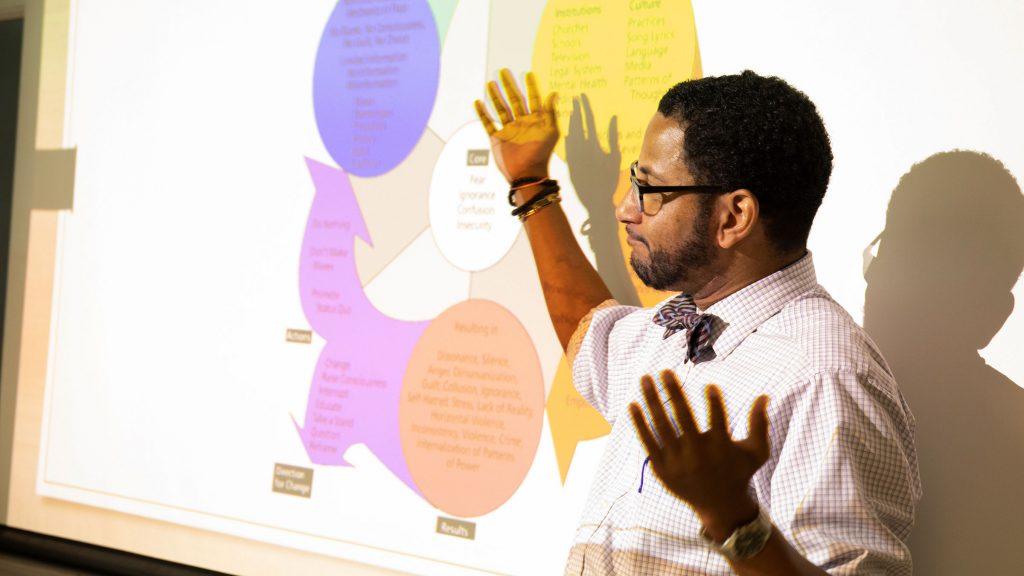Wearing many hats

Dr. Roslyn Vargas saw a mug once that had a dictionary entry written on the side. “Human resources (noun),” it said. And below that: “the unofficial lawyer, psychologist, event planner, teacher, peace maker, career planner, detective.”
Vargas, the Master of Science in Human Resource Management (MSHRM) program director, says of HR, “It’s a very interesting career. I think a lot of people don’t really understand what all goes into it.”
On a practical level, HR professionals oversee five main functions of a business, according to the Bureau of Labor Statistics:
- recruiting and hiring new employees
- training new hires
- serving as the liaison between employer and employee
- directing company culture
- overseeing disciplinary action
8 skills HR managers need
Needless to say, if you’re considering entering the field of human resources, you should expect to wear many hats. But some traits will help you weather the corporate storms more than others. Here are the skills Vargas suggests every good HR manager should possess.

Be an active listener
HR professionals sit on the fence, Vargas says. On the one hand, their loyalty is to the company who employed them. On the other hand, part of their job is making sure the employees are being treated well. In both cases, being a good listener—not just listening but actively listening (and responding)—is an important skill. That means taking in what the employee is saying verbally and through their body language, and formulating an appropriate response.
Be empathetic
Closely related to being an active listener is learning to be more empathetic. Vargas, who spent a long time as an HR professional before moving into the academic sphere, says that occasionally an employee will approach you with a specific issue that strikes you as insignificant. But even if you’re right, it feels significant to them. “HR folks have to put everything aside and just listen.”

Be able to think on your feet
Good judgment and good decision-making skills are crucial to the role of an HR manager. “Sometimes you don’t have a whole lot of time to think about things,” Vargas says, “and sometimes the issues become complex only because of the magnitude of an issue that occurs.”
In the case of a sexual harassment claim, for instance, you would be the first stop for the victim to file a report. If something they say doesn’t fit the law (and therefore the guidelines for next steps), good judgment can make the difference between resolution and legal action.
Keep up with the latest news
Having to explain certain rules to employees is part and parcel of the job for an HR manager, which means you’ll need to understand a whole host of legalities in order to effect change, keep the peace or just maintain the status quo. As local laws and regulations change, so too does the job of the person in HR. It’s important to keep up with current events and stay abreast of changes to the legislature.

Be a skilled communicator
Vargas says HR managers are the change agents for an organization. When CEOs or the board of directors mandate alterations to company programs or policies, it’s the HR department who organizes the rollout of information. Thus, both their written and verbal skills have to be top-notch. “It’s not what you say, it’s how you say it,” Vargas says.
Know how to keep a secret
HR managers are entrusted with a lot of confidential details—who’s filed a claim against another employee, what the claim was, who’s being let go—which means they have to be skilled at keeping their lips sealed. Not only could blabbing damage the trust you’ve built with colleagues (and your employers!), but in some cases it could have legal consequences.

Be good with numbers
This skill isn’t strictly necessary, Vargas says. There are plenty of HR professionals who don’t deal with payroll or billing. But if you want to advance to the highest positions in the company (and are taking the HR track to get there), mathematical know-how is crucial. “Everybody’s making decisions based on the numbers,” Vargas says. “If the top HR person wants the seat at that table in the C-suite, they need to understand how to speak in that language.”
Teach what you preach
The HR department is at the front of the classroom, so to speak, when it comes to complicated employment topics such as open enrollment. Vargas says a good HR person doesn’t just lay out options A, B and C, but also explains each of them, giving agency to the employee. “Knowledge is power,” she says.

